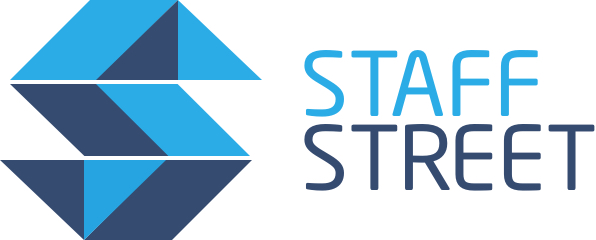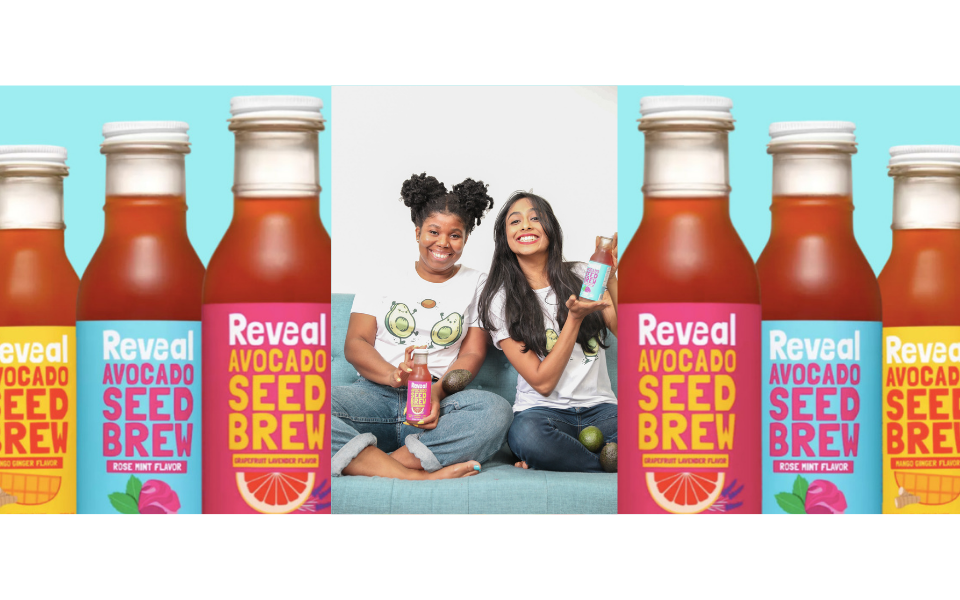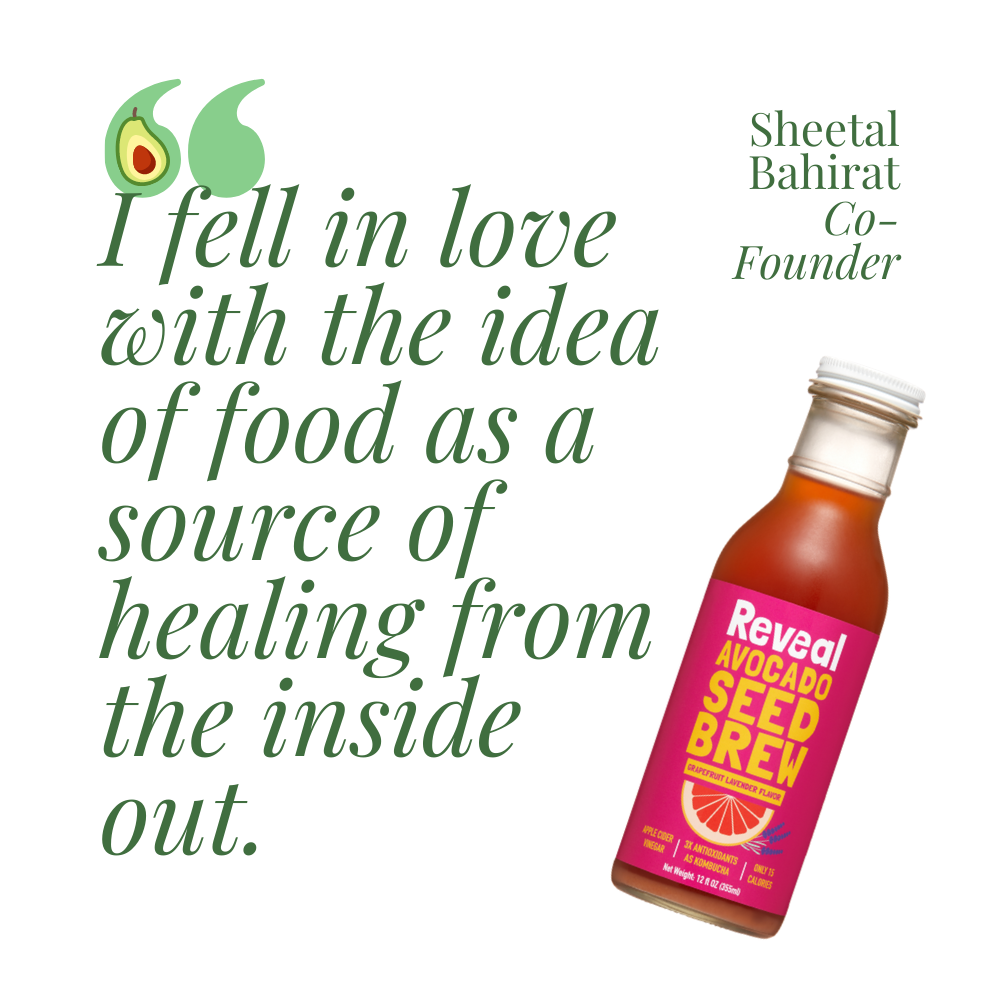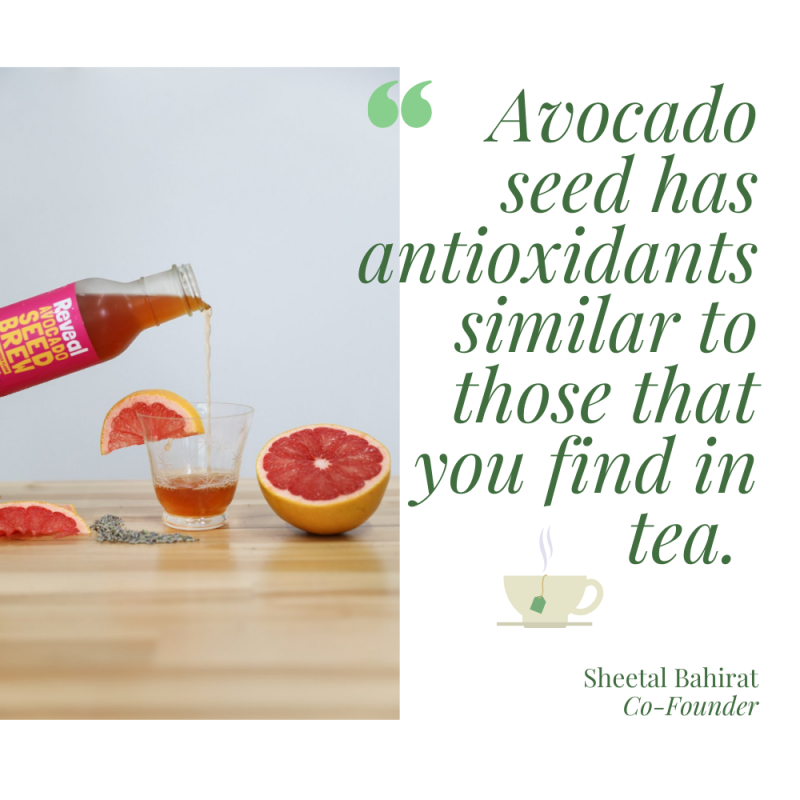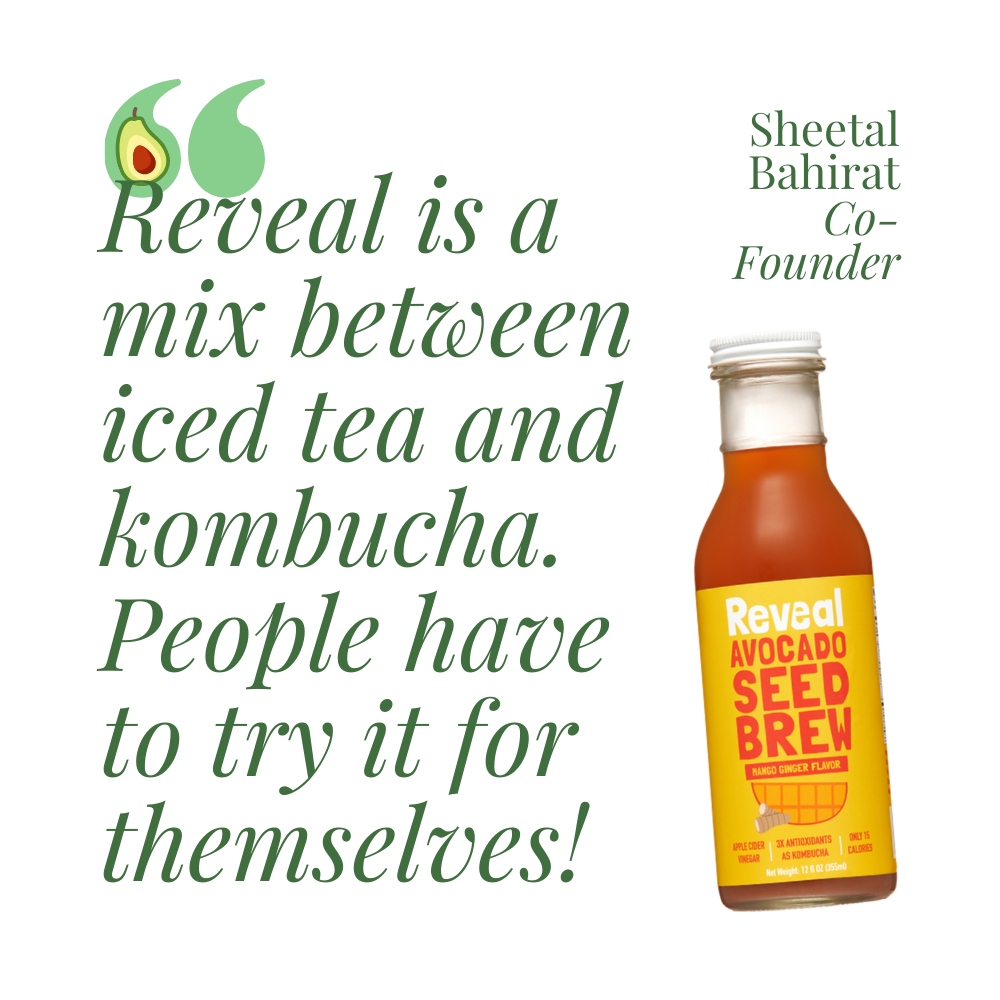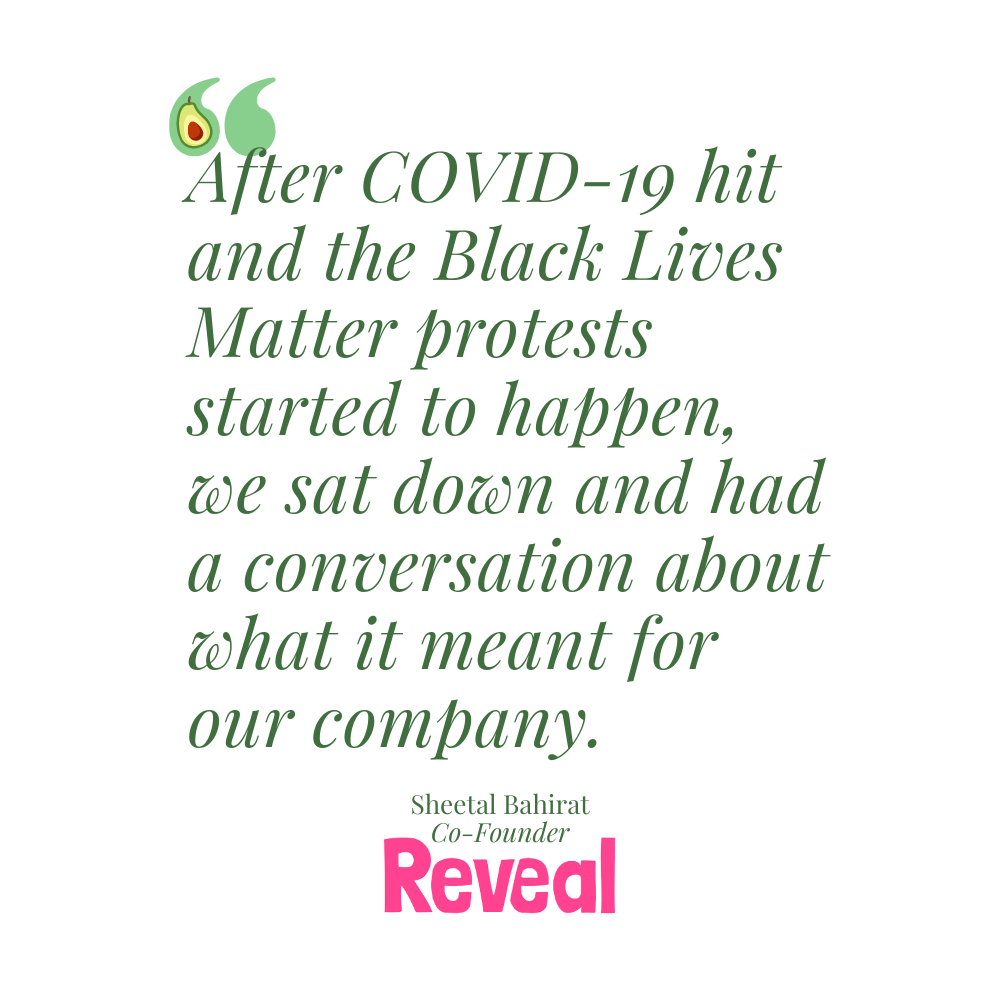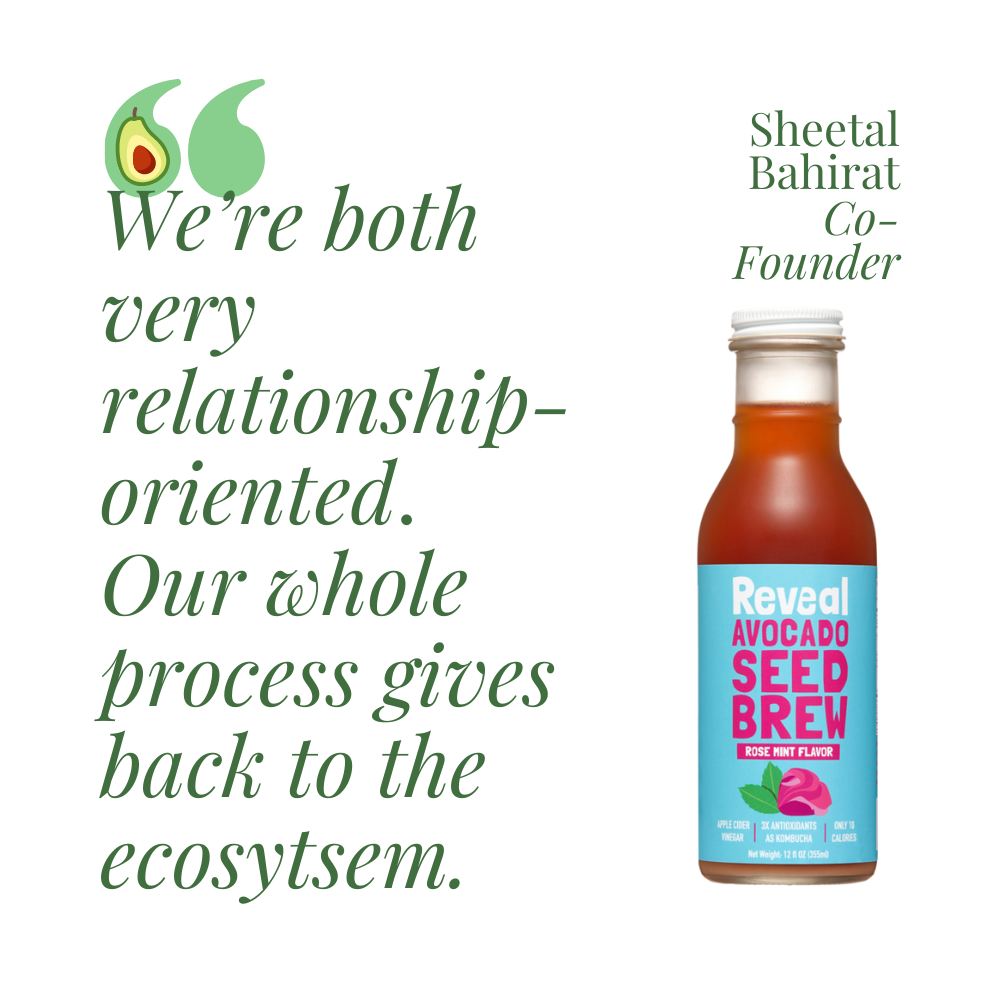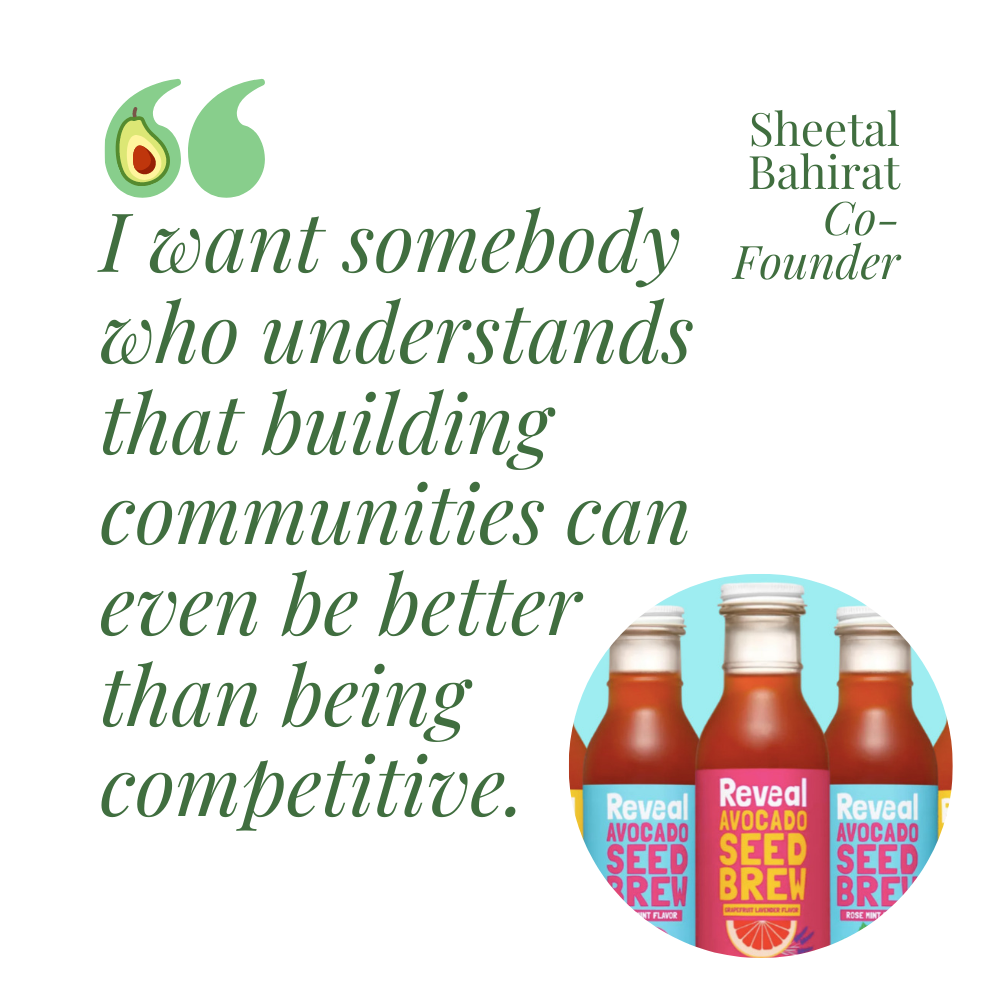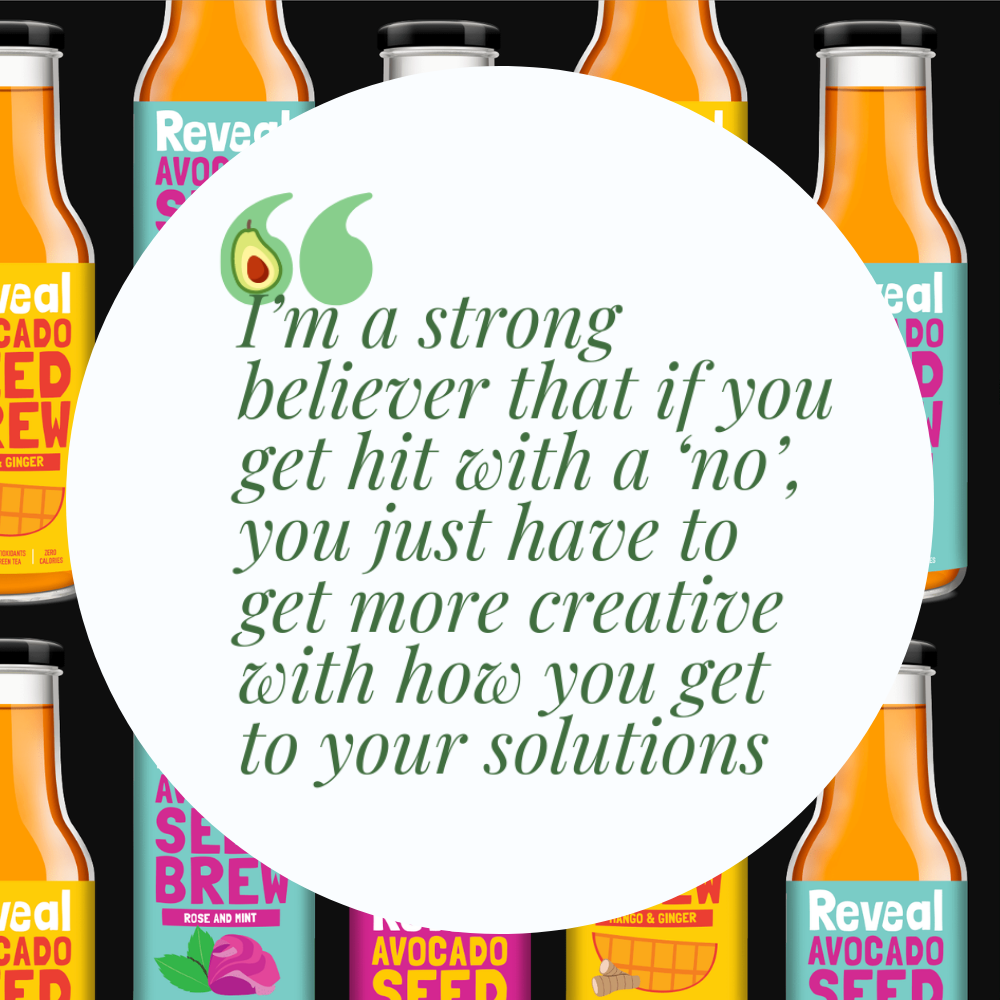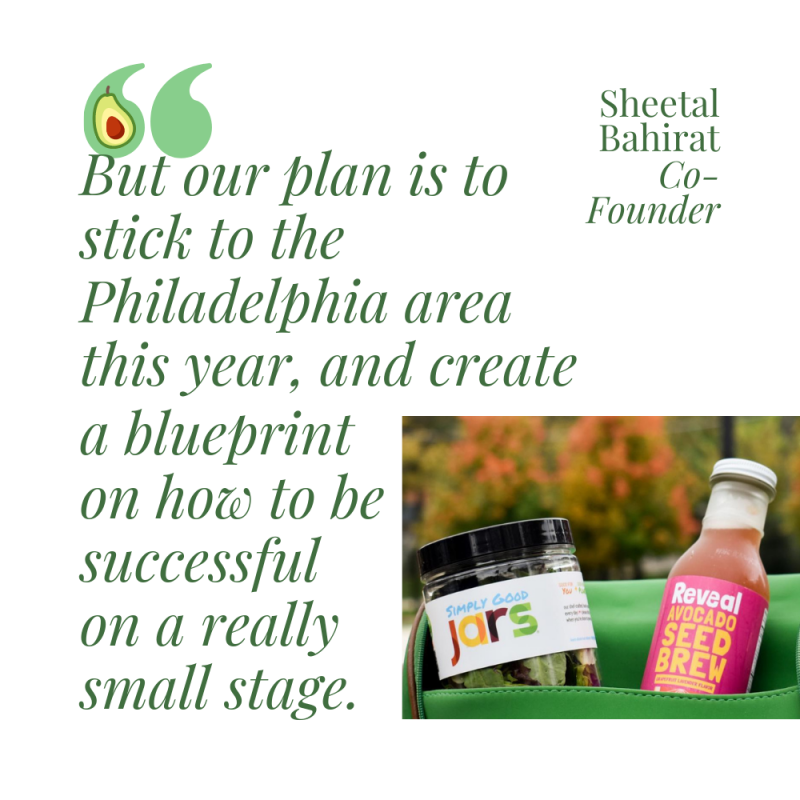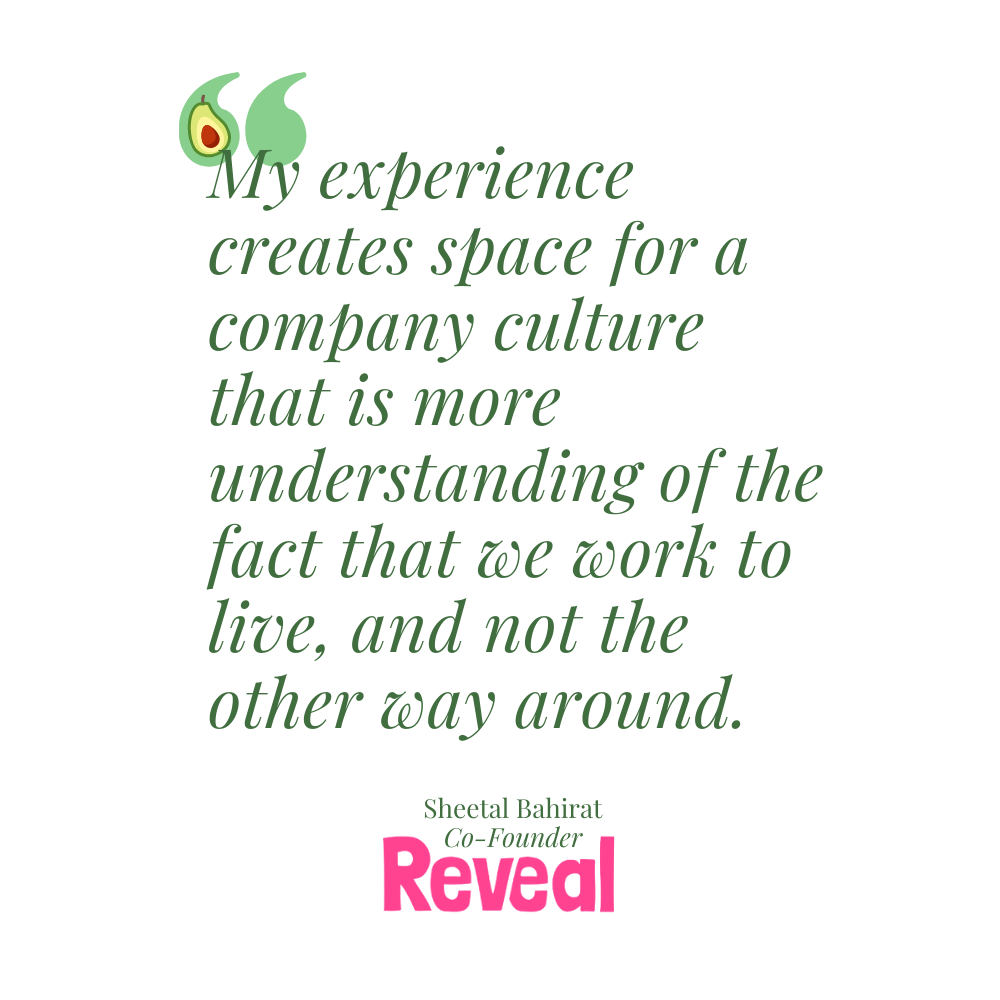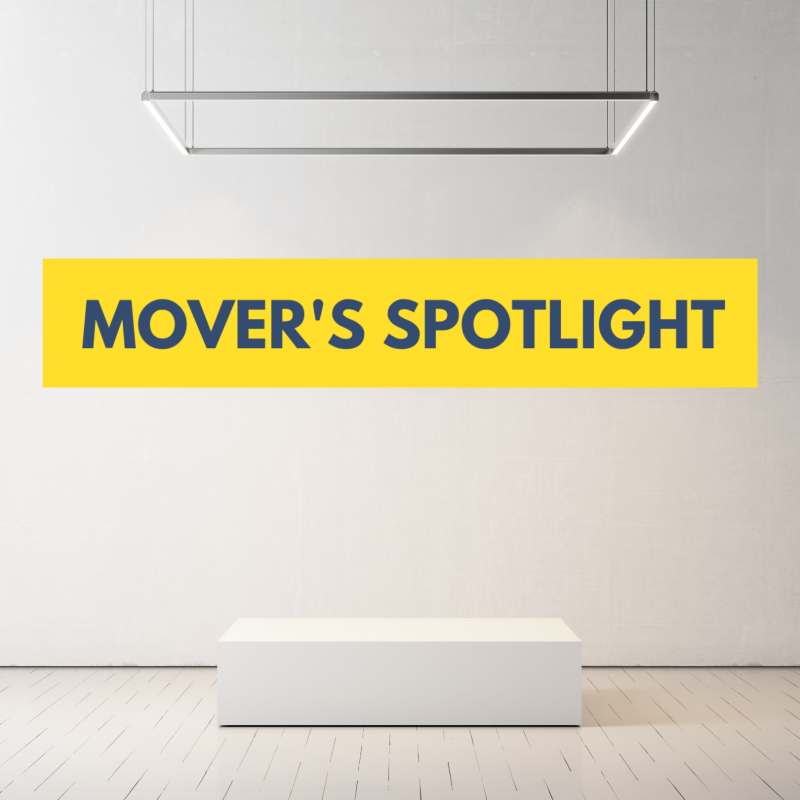
Let’s go back to the beginning. Tell us a bit about yourself, Sheetal, and how Hidden Gems and Reveal came to be.
Sheetal Bahirat: The story behind Reveal starts all the way back when I was working as a personal stylist. During that time in my life, I realized that people were coming to me to solve issues that a wardrobe could not fix. The real solutions were in the food that people ate, and the way that people took care of themselves and their mental health and fitness. That was when I fell in love with the idea of food as a source of healing from the inside out.
So, I started my own cold pressed juice company with my mom. And that was when I discovered food waste from an opportunity standpoint. I still remember the time when we found the most beautiful pineapples I’d ever seen my whole life. And the next day, after we juiced them, a few seconds later, they were just garbage. I was like, “What happened here?” Three seconds ago, I was fawning over this fruit. And now parts of it had to be thrown away. That set me on this journey to figure out what we can do with the parts of food that we discard.
Eventually, I decided to close down my company, move halfway around the world, go to Drexel University, and do my Master’s in Culinary Arts and Science to learn the science part of figuring out what to do with food taste.
What realizations did you gain during your time at Drexel?
Sheetal Bahirat: Well, one day I was making guacamole in class. I had a huge bowl of avocado peels and seeds, and so little pulp. That’s when I started to wonder, “What can I do with these?” It started with a question and a whole lot of curiosity. It wasn’t like I wanted to start a business with avocados right off the bat.
Everyone throws away avocado seeds because they’re too hard to go into commercial composters, and they don’t compost very well. They go straight to the landfill. Every week, we throw away 15 million pounds of avocado seeds in the U.S., which continues to blow my mind to this day.
In doing so, we are throwing away 90% of the antioxidants in an avocado by discarding the peel and the seeds. So, I did my master’s thesis on the avocado seed to understand what we can do with them, how we can extract the goodness from them, and put it in a format that would be accepted by consumers.
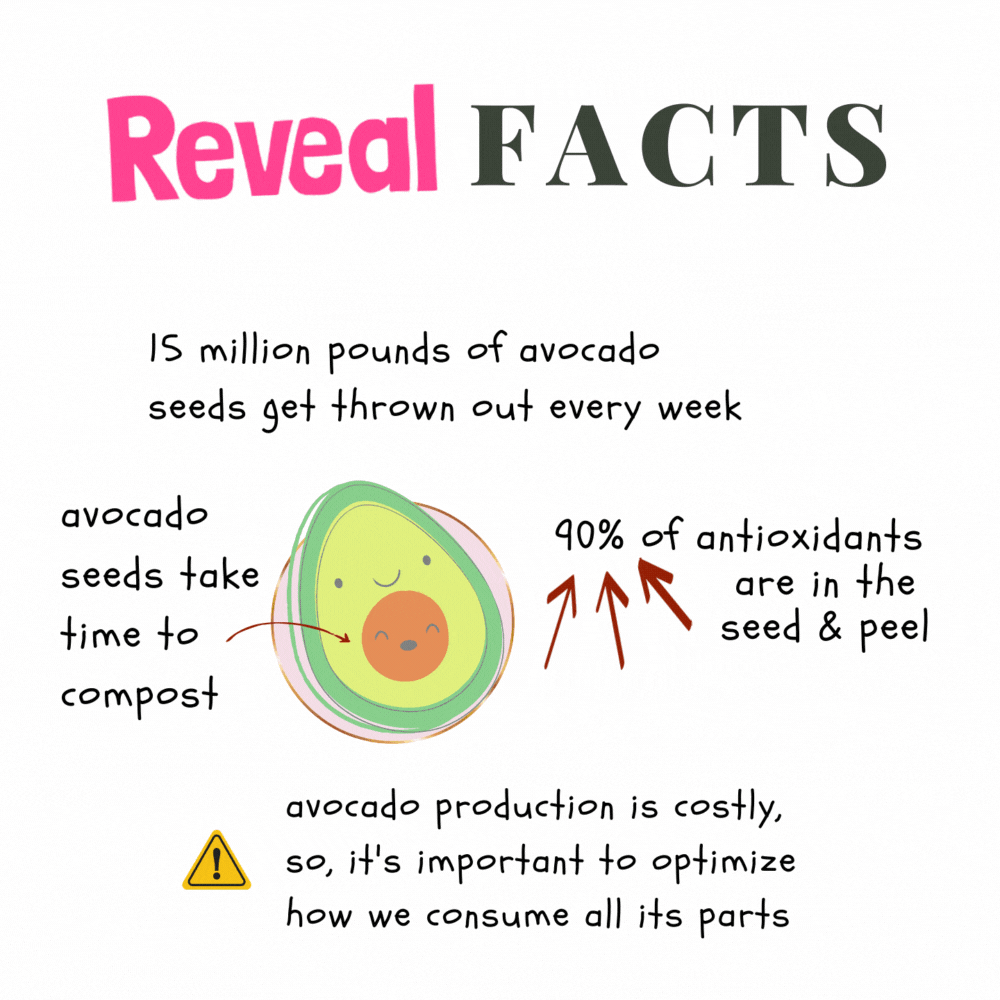
By the end, Zuri Masud, a classmate of mine who had watched me go through this research journey, and who was super interested in sustainability, decided to join forces with me. She’s one of my most favorite people. Together, we went into the food accelerator program, and, many years later, here we are.
I guess that’s where the Hidden Gems comes from: the hidden gems being the opportunity of upcycling parts of fruits that would otherwise go to waste?
Sheetal Bahirat: Yeah, if you look at an avocado seed, it really does almost look like a gem. We call it Hidden Gems because it’s full of value that people don’t see because we are not paying attention. And then Reveal would be revealing the true value that is otherwise overlooked.
Unpack what those early days of development were like—it sounds like you discovered that avocado seeds are actually very versatile.
Sheetal Bahirat: They are! Apart from the antioxidants, they’re full of starches. There’s some amount of protein in there. It turns into a really good activated charcoal which can be used to suck out heavy metals out of water When you boil avocado seeds in water, in general, they tend to absorb the metals in the water. People have done a lot of fascinating research on what avocado seeds can do.
Personally, I wanted to transform avocado seeds into a format that people would get excited about. The thing that really stood out to me was the nutrition found in the seed. It has antioxidants similar to those that you find in tea. The first iteration that I actually made was a tea bag.
We ended up with the final formulation that we have today by testing it out with more than 700 people. We took the tea bag to an event and people were just like, “Oh that’s kind of cool, whatever.” And I was like, “No, you’re not giving it enough credit!” I definitely felt that people should be more excited than they were (laughs).
And how did you manage to get people more excited about it?
Sheetal Bahirat: I decided to attend another event but, this time around, I actually made the tea. I brewed and served hot tea, and it got a much better response. People were much more interested in having a conversation with me. They were asking me questions. So, I was like “This is good. But how do I take the next level and actually commercialize it?” So, I changed it into an iced tea for the next event.
For the least two years, I went to any food event that would have me. And I would brew my tea, I would push this little cart around, and we would taste test with customers and listen to them. We tested three types of containers with labels on them—one had three times the amount of antioxidants as green tea, the next one had probiotics, and the other one had zero calories. Then, we asked people to pick one out of three to try and see what people were more interested in.
So, we did a lot of that kind of testing before we even figured out what the right formulation would be. It has been a work in progress. Honestly, I still think it’s work in progress. I don’t think we’ve come to a place where we think, “Oh, this is what a Reveal beverage is going to be for the rest of its life”.
It’s great that you brought up testing with different people. How did they react? What did people say when you explained that they were drinking avocado seed?
Sheetal Bahirat: For the most part, people were like, “Do you mean like the center or the skin of the seed?” and “I didn’t even know you could eat that.” We got a lot of questions about the color and the taste. I found the taste question a little hard to answer because it’s not easy to say that it tastes like tea. Because it’s not tea. It tastes like an avocado seed, but nobody’s tasted one (laughs).
With the formulation that we have now, using apple cider vinegar, monk fruit, and other flavors, I would say a Reveal beverage tastes like a mix between iced tea and kombucha. But it’s still not something I can explain. People have to really try it for themselves!
And then whenever we say the word “upcycle”, I get a lot of “What’s that?” Which is always interesting. I love to answer that question. I also get a lot of “How do you make it?” all the time.
You brought her on Zuri Masud after meeting her at Drexel. Was she also taking up the same course?
Sheetal Bahirat: So, I did my Master’s in Culinary Arts and Sciences, and she did her Master’s in Food Science. We had most of our classes together.
Can you talk about your dynamics? What’s your favorite thing about working with her?
Sheetal Bahirat: Our personalities are really different. I’m energetic and enthusiastic. I want to get stuff done! She’s calmer. She likes to think things through before getting them done. So, we balance each other really well.
It has been really rewarding working with her. After COVID hit and the Black Lives Matter protests started to happen, we sat down and had a conversation about what it meant for our company. How we fit into the big picture of everything that’s going, how we wanted to contribute, and how both of us could make a meaningful impact, and so on. The fact that we could have a conversation to talk about all of that was so fulfilling.
We were able to be on each other’s team. I feel blessed that I have somebody like her that I can talk to about pretty much anything. No matter what life throws at us, we can figure out a way to sit down and really find creative solutions together.
Thank you so much for sharing that. What lessons can you draw from your relationship with Zuri that you think will shape the way you build up the Reveal team moving forward?
Sheetal Bahirat: For me and for Zuri, we’re both very relationship-oriented. There’s a couple of ways for me to explain this. I’ll go back to the analogy of the avocado. No one cares about it. Because of that, it goes into the landfill and gets stuck in an environment that sucks for it. It gets stuck between layers of plastic and that creates greenhouse gases and toxins that seep into the land, into the water, and into the air.
Then, we came along. We know that this avocado seed is actually super valuable. There is so much that it has to give. So, then, we take them and we make this drink that contributes to society. It creates a healthy beverage for the customer. It creates jobs and contributes to the economy. And after we’re done, we’re able to compost the seeds. Our whole process gives back to the ecosystem.
In this context, you have two people trying to make a difference, thinking that something is really valuable. And I think that’s the same with people.
In a way, there’s a hidden gem worth cultivating in every person.
Sheetal Bahirat: When you put people in an environment that helps them thrive, they will contribute to everything. When we grow our team, it’s really important for us to think about adding people who understand the value of the work, of being really inclusive, and of giving people the supportive platform to open up and change things around them.
Another dream that’s really important for us as we grow this company is to create a job stream for people who were previously incarcerated. To give them training and put them in a position where they can actually apply for a full-time, well-paying job that will allow them to create stronger family systems.
Between all of that, we want to work with people who understand and care enough about committing to that vision: that we’re in it together. I don’t think I want somebody who’s super competitive on my team. I want somebody who is community-oriented, and who understands that building communities can even be better than being competitive. So, the value systems of the people we bring on are going to be very important to us.
In relation to that, as a brand that’s built on finding solutions for food wastage and improving the food ecosystem, what advice would you give entrepreneurs who are looking to do the same thing?
Sheetal Bahirat: My only advice is don’t take ‘no’ for an answer. When we first started, we had so many people tell us that it was impossible. We paid one woman money to help us with formulation. After she had taken my money, she told me that we were never going to be able to scale it up. She didn’t even give me a formulation at the end!
And I felt really bad about it. I was like, “Should I listen to her?” If I had, if I actually believed that this dream is over, then I would have missed all creative ways and opportunities in which we got around those limitations.
I’m a strong believer that if you get hit with a ‘no’, you just have to get more creative with how you get to your solutions. Think out of the box and keep moving towards that vision.
Reveal is obviously challenging people to reimagine the possibilities with avocado seends. What was your experience last year? Did you find other channels to communicate what you guys are doing given all the limitations with testing and sampling?
Sheetal Bahirat: I wish I had a good answer for you. But honestly (laugh)—we were geared to launch our product in April of 2020. Like, the week before lockdown, we were supposed to have our first production run. We had everything ordered and sent to the production facility, and we were about to go in but they were like, “Sorry! Everything’s cancelled!”
So, when we did finally launch in August, we launched with GoPuff. They’re such an amazing company. They were able to give us the opportunity to go out into the world, whereas a lot of othe retail companies were still trying to get back from being thrown off course by the pandemic.
We thought the next step would be to go direct-to-consumer. But we realized there were so many issues with that.
Such as?
Sheetal Bahirat: Firstly, we were in a glass bottle and we were particular about why we wanted to be in a glass bottle. We didn’t want people to worry about what it looked like. People could see right through it. We didn’t want to hide anything, which is one of the issues that we’ve heard about some products in upcycling. But then our glasses started to break.
Now that retail has started to pick up, things are getting much better for us. In the last month, we’ve gotten confirmation on thirty locations.
Until about last month, we were still really struggling. Especially with online sampling—which for us has been a nightmare. Not only are you now giving away free products, but you also have to cover shipping and packaging. And, honestly, our finances just weren’t in the place where we could afford that. And we wanted to spend our money really wisely.
As female founders, it’s definitely more challenging to raise funding. So, yeah, we are definitely cognizant of the fact that it might take us forever to raise money. Whatever money we do have, we don’t want to spend it right away.
It sounds like you had a tough year, but you guys seem to have pushed through. Where would you say Reveal is now?
Sheetal Bahirat: So, we just got into Whole Foods. So, we’re going to be launching with them pretty soon. And the way we got into Whole Foods is we can get into any store in the region if they want us – which opens up the biggest Whole Foods regions to us.
But our plan is to stick to the Philadelphia area this year, and create a blueprint on how to be successful on a really small stage. We want to do all our experiments here and to figure out what works so that we can say, “Oh, I want to go to New York and I know exactly what to replicate.” That allows us to figure out the plans, all of the budgeting and the finances. Plus, we also want to spend time this year to find the right people to help us grow this company and build this team out.
Here’s a more personal question. As a founder, what would you say is the most surprising thing that you’ve learned about yourself?
Sheetal Bahirat: I think that it has a lot to do with getting the image of what a productive life should look like out of my head. Every time I’ve heard of a female founder who has had a baby, it’s like, “Oh I had a baby and I was in an investors meeting three hours after labor, just go go go, working 24/7 all the time.”
I’m not saying that I don’t work hard. But I know that when I schedule my time, I take time to work out, to nurture my friendships, and my relationship with my family. I invest time in things that make me happier, that give me more energy to pour into Reveal.
So, changing the mindset about what being productive should look like has been a journey. Comparing what I think productive looks like versus creating my own definition of what productivity and success means to me on a day-to-day basis has created a world of difference.
More than that, I think my experience creates space for a company culture that is more understanding of the fact that we work to live, and not the other way around.
That’s actually really inspiring. Thank you for sharing that. My last question is: if you could ask any entrepreneur in the industry any question, who would you ask and what would the question be?
Sheetal Bahirat: I would probably sit down with Seth Goldman, the founder of Honest Tea. I know he wrote a book and I read the book. But I want to know the smallest things. Like, how did he actually get started? Don’t tell me the story about “One day I went into Whole Foods and the next day, I’m on Whole Foods.” No! (laughs)
I want to know: “How many times were you there? How did you build the relationships? What things were the most rewarding? Or what things gave back to your company tenfold that you would do repeatedly? What were the points where you almost gave up? And what kept you going?”
I would love to know that stuff. A lot of that stuff gets skimmed over when you’re talking about the story. I really love what Seth built with Honest Tea, and with fair trade and everything. That was revolutionary. So, I would love to know that stuff so we can implement some of that with Reveal!
